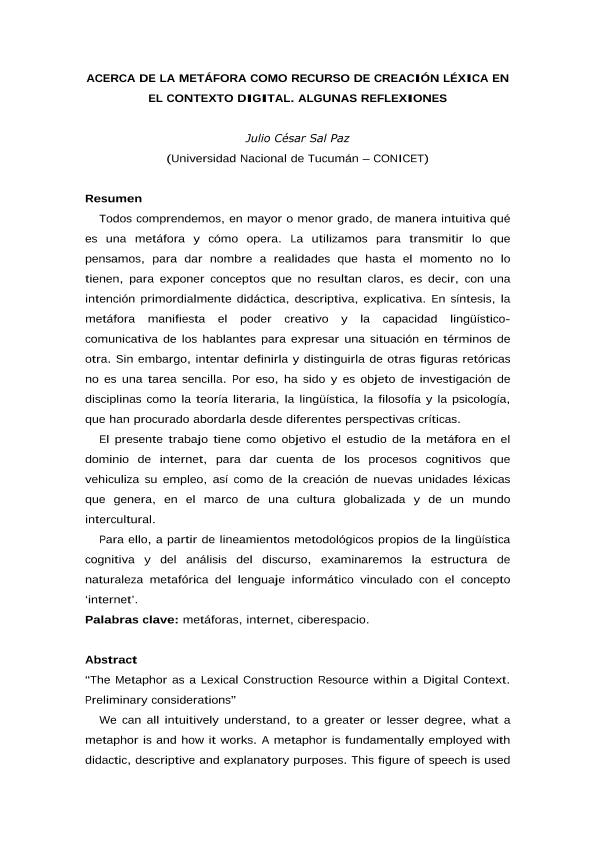Mostrar el registro sencillo del ítem
dc.contributor.author
Sal Paz, Julio Cesar

dc.date.available
2019-05-17T17:45:11Z
dc.date.issued
2009-12
dc.identifier.citation
Sal Paz, Julio Cesar; Acerca de la metáfora como recurso de creación léxica en el contexto digital. Algunas reflexiones; Servicio de Publicaciones de la Universidad de Murcia; Tonos Digital Revista Electrónica de Estudios Filológicos; 18; 12-2009; 1-33
dc.identifier.issn
1577-6921
dc.identifier.uri
http://hdl.handle.net/11336/76635
dc.description.abstract
Todos comprendemos, en mayor o menor grado, de manera intuitiva qué es una metáfora y cómo opera. La utilizamos para transmitir lo que pensamos, para dar nombre a realidades que hasta el momento no lo tienen, para exponer conceptos que no resultan claros, es decir, con una intención primordialmente didáctica, descriptiva, explicativa. En síntesis, la metáfora manifiesta el poder creativo y la capacidad lingüístico - comunicativa de los hablantes para expresar una situación en términos de otra. Sin embargo, intentar definirla y distinguirla de otras figuras retóricas no es una tarea sencilla. Por eso, ha sido y es objeto de investigación de disciplinas como la teoría literaria, la lingüística, la filosofía y la psicología, que han procurado abordarla desde diferentes perspectivas críticas. El presente trabajo tiene como objetivo el estudio de la metáfora en el dominio de internet, para dar cuenta de los procesos cognitivos que vehiculiza su empleo, así como de la creación de nuevas unidades léxicas que genera, en el marco de una cultura globalizada y de un mundo intercultural. Para ello, a partir de lineamientos metodológicos propios de la lingüística cognitiva y del análisis del discurso, examinaremos la estructura de naturaleza metafórica del lenguaje informático vinculado con el concepto internet.
dc.description.abstract
We can all intuitively understand, to a greater or lesser degree, what a metaphor is and how it works. A metaphor is fundamentally employed with didactic, descriptive and explanatory purposes. This figure of speech is used to express thoughts, to give a particular name to formerly unnamed realities and to explain difficult concepts. In short, the creative power, the ability to communicate and the linguistic competence of speakers are proved by the use of metaphors, i.e. by expressing a situation in terms of another. Nonetheless, neither defining nor distinguishing a metaphor from other figures of speech is an easy task. Hence, the metaphor is the object of interdisciplinary research from diverse fields of knowledge such as literary theory, linguistics, philosophy and psychology. The purpose of this paper is to study the metaphor on the internet, the cognitive processes which allow the use of this figure of speech on the World Wide Web and the coining of new lexical items as a result of the use of metaphors within the framework of a global culture in an inter-cultural world. In order to achieve the formerly expounded purpose the metaphorical nature of the structure of language in the realm of computing, i. e. language related to the concept of “internet”, is going to be methodologically analyzed under the light of cognitive linguistics and discourse analysis.
dc.format
application/pdf
dc.language.iso
spa
dc.publisher
Servicio de Publicaciones de la Universidad de Murcia
dc.rights
info:eu-repo/semantics/openAccess
dc.rights.uri
https://creativecommons.org/licenses/by-nc-sa/2.5/ar/
dc.subject
Metáfora
dc.subject
Léxico
dc.subject
Ciberespacio
dc.subject
Análisis del Discurso
dc.subject.classification
Estudios Generales del Lenguaje

dc.subject.classification
Lengua y Literatura

dc.subject.classification
HUMANIDADES

dc.title
Acerca de la metáfora como recurso de creación léxica en el contexto digital. Algunas reflexiones
dc.title
The Metaphor as a Lexical Construction Resource within a Digital Context. Preliminary considerations
dc.type
info:eu-repo/semantics/article
dc.type
info:ar-repo/semantics/artículo
dc.type
info:eu-repo/semantics/publishedVersion
dc.date.updated
2019-05-06T13:51:19Z
dc.journal.number
18
dc.journal.pagination
1-33
dc.journal.pais
España

dc.journal.ciudad
Murcia
dc.description.fil
Fil: Sal Paz, Julio Cesar. Consejo Nacional de Investigaciones Científicas y Técnicas. Centro Científico Tecnológico Conicet - Tucumán. Instituto de Investigaciones sobre el Lenguaje y la Cultura. Universidad Nacional de Tucumán. Facultad de Filosofía y Letras. Cátedra de Literatura Argentina. Instituto de Investigaciones sobre el Lenguaje y la Cultura; Argentina
dc.journal.title
Tonos Digital Revista Electrónica de Estudios Filológicos
dc.relation.alternativeid
info:eu-repo/semantics/altIdentifier/url/http://www.um.es/tonosdigital/znum18/secciones/estudio-20-metafora.htm
Archivos asociados
